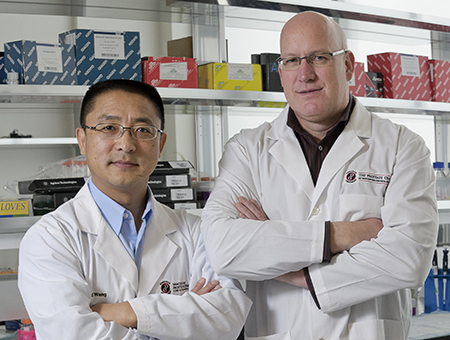Researchers at the Vancouver Prostate Centre (VPC) have successfully grown early-stage human prostate cancers in mice, providing unprecedented levels of accuracy in seeing how patient-specific prostate tumors respond to drug therapies or develop drug resistance.
Yuzhuo Wang, Associate Professor in the Department of Urologic Sciences and senior scientist at the VPC and BC Cancer Agency, is the first researcher in the world to successfully grow such tissue in animal hosts. He was even able to grow tissue from tiny needle biopsy specimens, which previously was not possible.
The tissue has been used to create and standardize a bank of state-of-the-art prostate cancer models that, for the first time, capture the diverse biological and molecular makeup of primary prostate cancers. More significantly, the models mimic the patient’s disease progression and response to therapies.
“Pre-clinical models that can truly mimic a patient’s clinical situation are critically important,” Dr. Wang says. “They allow us to develop and test better therapeutics in advance of clinical trials in people. Research findings derived from the models should have higher relevance to patients because the models are much closer to the real world – this allows us to do all sorts of cancer discoveries and validate novel therapeutics for clinical trials.”
Prior to this discovery, prostate cancer researchers were limited to a handful of prostate cancer cell lines grown in an incubator in a plastic dish, completely disconnected from their normal context of being within a patient’s body, explains collaborator Colin Collins, Professor in the Department of Urologic Sciences and a Senior Scientist at VPC.
Dr. Wang, Dr. Collins and their collaborators described their achievement in the journal Cancer Research.
“Dr. Wang’s breakthrough method gives the grafted tumor good blood supply, which means it behaves like a real cancer and it is much easier for experimental therapeutics to access it,” says Dr. Collins, whose team tested how closely the models mirrored the patient tumors from which they were derived.
“These really are ‘high-fidelity models’ because they do in fact preserve all the salient genetic features of the patient tumor,” he explains. “We hope this will let us sequence a patient’s tumor, predict the best drugs from the sequence, and then evaluate and select the most efficacious drug that is the least toxic to the patient using this technology.”
The combination of sequencing a patient’s tumor and evaluation of yet-to-be-developed or existing therapies in the model will form a solid foundation for evidence-based precision oncology. Moreover, a recent discovery in Dr. Collins’s lab using the models has already given the team exciting and profound insight into one of the most lethal forms of prostate cancer.
“In the coming years we can see new therapeutics will be tested in the models and more personalized therapy cases will likely be carried out using these models and molecular profiling,” says Dr. Wang. “Our work certainly addresses an unmet need in prostate cancer research.”
